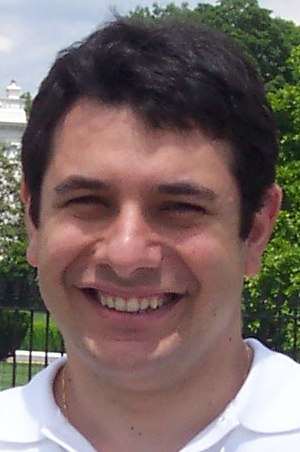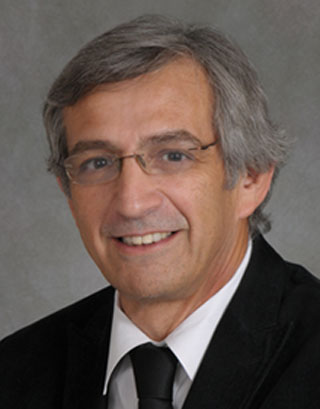Visitors
Professor Dimitrios S. Nikolopoulos
School of Electronics, Electrical Engineering and Computer Science
Queen's University of Belfast, UK
When:Nov 12,2015, 10:30AM
Where:E & CS Auditorium, First Floor
What:New Approaches to Energy-Efficient and Resilient HPC
Email:d.nikolopoulos@qub.ac.uk
Homepage: http://www.cs.qub.ac.uk/~D.Nikolopoulos/
ABSTRACT
This talk explores new and unconventional directions towards improving the energy-efficiency of HPC systems. Taking a workload-driven approach, we explore micro-servers with programmable accelerators; non-volatile main memory; workload auto-scaling and structured approximate computing. Our research in these has achieved significant gains in energy-efficiency while meeting application-specific QoS targets. The talk also reflects on a number of UK and European efforts to create a new energy-efficient and disaggregated ICT ecosystem for data analytics.
Bio: Dimitrios S. Nikolopoulos is Professor in the School of EEECS, at Queen's University of Belfast and a Royal Society Wolfson Research Fellow. He holds the Chair in High Performance and Distributed Computing and directs the HPDC Research Cluster, a team of 20 academic and research staff. His research explores scalable computing systems for data-driven applications and new computing paradigms at the limits of performance, power and reliability. Dimitrios received the NSF CAREER Award, the DOE CAREER Award, and the IBM Faculty Award during an eight-year tenure in the United States. He has also been awarded the SFI-DEL Investigator Award, a Marie Curie Fellowship, a HiPEAC Fellowship, and seven Best Paper Awards including some from the leading IEEE and ACM conferences in HPC, such as SC, PPoPP, and IPDPS. His research has produced over 150 top-tier outputs and has received extensive (£10.6m as PI/£39.5m as CoI) and highly competitive research funding from the NSF, DOE, EPSRC, SFI, DEL, Royal Academy of Engineering, Royal Society, European Commission and private sector. Dimitrios is a Fellow of the British Computer Society, Senior Member of the IEEE and Senior Member of the ACM. He earned a PhD (2000) in Computer Engineering and Informatics from the University of Patras.
Professor Lieber, Baruch Barry
Department of Neurosurgery
Stony Brook University
When:Nov. 6, 2015, 10:30AM
Where: E & CS Auditorium, First Floor
What:Flow Diverters to Cure Cerebral Aneurysms a Case Study - From Concept to Clinical
Email: Baruch.Lieber@stonybrookmedicine.edu
Homepage:http://neuro.stonybrookmedicine.edu/about/faculty/lieber
ABSTRACT
Ten to fifteen million Americans are estimated to harbor intracranial aneurysms (abnormal bulges of blood vessels located in the brain) that can rupture and expel blood directly into the brain space outside of the arteries causing a stroke. A flow diverter, a refined tubular mesh-like device that is inserted through a small incision in the groin area (no need for open brain surgery) and navigated through a catheter into cerebral arteries to treat brain aneurysms is delivered into the artery carrying the aneurysm. The permeability of the device is optimized such that it significantly reduces the blood flow in the aneurysm, while keeping small side branches of the artery open to supply critical brain tissue. The biocompatible device elicits a healthy scar-response from the body that lines the inner metal surface of the device with biological tissue, thus restoring the diseased arterial segment to its normal state. Refinement in the design of such devices and prediction of their long term creative effect, which usually occurs over a period of months can be significantly helped by computer modeling and simulations of the flow alteration such devices impart to the aneurysm. The evolution of these devices will be discussed from conception to their current clinical use.
Bio: Barry Lieber attended Tel-Aviv University and received a B.Sc. in Mechanical Engineering in 1979. He then attended Georgia Tech and received M.Sc. in 1982 and a Ph.D. in 1985, both in Aerospace Engineering Ph.D. working with Dr. Don P. Giddens. Barry Lieber was a Postdoctoral Fellow from 1985-1987 at the Department of Mechanical Engineering at Georgia Tech and also completed a summer fellowship at Imperial College London in 1986. In 1987 Barry Lieber joined the faculty of the Department of Mechanical and Aerospace Engineering at the State University of New York at Buffalo as Assistant Professor. In 1993 he was promoted to the rank of Associate Professor with tenure and in 1998 was promoted to full professor. In 1994 he became Research Professor of Neurosurgery and in 1997 he became the Director of the Center for Bioengineering at the State University of New York at Buffalo, both position he held until his departure from the university in 2001 to Join the University of Miami as professor in the Department of Biomedical Engineering with a joined appointment in the Department of Radiology. In 2010 he joined the State University of New York at Stony Brook at the rank of professor in the department of Neurosurgery and also serves as program faculty in the department of Biomedical Engineering. Barry Lieber was elected as fellow of the American Institute for Medical and Biomedical Engineering in 1999. He was elected as fellow of the American Society of mechanical Engineers in 2005 and served as the Chairman of the Division of Bioengineering of the American Society of Mechanical Engineers in 2009.
Professor Marek Behr
Professor Christos Antonopoulos
Professor Yongjie Jessica Zhang
Professor David Marcum
Professor Kyle Gallivan
Professor Suzanne M. Shontz
Workshops
Outreach

